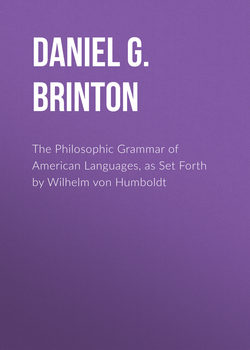Читать книгу The Philosophic Grammar of American Languages, as Set Forth by Wilhelm von Humboldt - Daniel G. (Daniel Garrison) Brinton - Страница 10
The Philosophic Grammar of American Languages
§ 10. Criteria of Rank in Languages
ОглавлениеHumboldt’s one criterion of a language was its tendncy to quicken and stimulate mental action. He maintained that this is secured just in proportion as the grammatical structure favors clear definition of the individual idea apart from its relations, in other words, as it separates the material from the inflectional elements of speech. Clear thinking, he argued, means progressive thinking. Therefore he assigned a lower position both to those tongues which inseparably connect the idea with its relations, as the American languages, and to those which, like the Chinese and in a less degree the modern English, have scarcely any formal elements at all, but depend upon the position of words (placement) to signify their relations.
But he greatly modified this unfavorable judgment by several extenuating considerations.
Thus he warns us that it is of importance to recognize fully “that grammatical principles dwell rather in the mind of the speaker than in the material and mechanism of his language.”35
This led him to establish a distinction between explicit grammar, where the relations are fully expressed in speech, and implicit grammar, where they are wholly or in part left to be understood by the mind.
He expressly and repeatedly states that an intelligent thinker, trained in the grammatical distinctions of a higher language, can express any thought he has in the grammar of any other tongue which he masters, no matter how rude it is. This adaptability lies in the nature of speech in general. A language is an instrument, the use of which depends entirely on the skill of him who handles it. It is doubtful whether such imported forms and thoughts appeal in any direct sense to those who are native to the tongue. But the fact remains that the forms of the most barbarous languages are such that they may be developed to admit the expression of any kind of idea.
But the meaning of this must not be misconstrued. If languages were merely dead instruments which we use to work with, then one would be as good as another to him who had learned it. But this is not the case. Speech is a living, physiological function, and, like any other function, is most invigorating and vitalizing when it works in the utmost harmony with the other functions. Its special relationship is to that brain-action which we call thinking; and entire harmony between the two is only present when the form, structure and sounds of speech correspond accurately to the logical procedure of thought. This he considered “an undeniable fact.”
35
Lettre à M. Abbe-Remusat, Ges. Werke, Bd. vii, s. 396.
